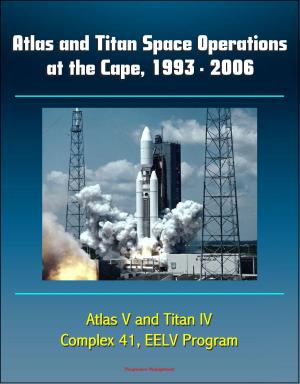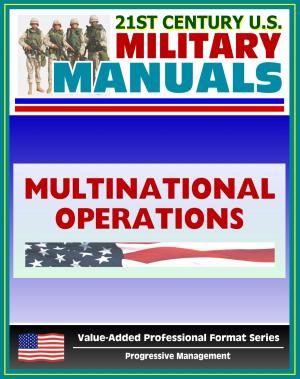Brazil's Rise to Global Power: Bolsa Familia, Neoliberal Reform and Trade Partnerships, Military Capabilities, Defense Spending, Soft Power Projection, Role in International Organizations
Nonfiction, History, Americas, South America, Social & Cultural Studies, Political Science| Author: | Progressive Management | ISBN: | 9781310992933 |
| Publisher: | Progressive Management | Publication: | May 6, 2015 |
| Imprint: | Smashwords Edition | Language: | English |
| Author: | Progressive Management |
| ISBN: | 9781310992933 |
| Publisher: | Progressive Management |
| Publication: | May 6, 2015 |
| Imprint: | Smashwords Edition |
| Language: | English |
Professionally converted for accurate flowing-text e-book format reproduction, this military study assesses the rise of Brazil as a global power. To examine this, the research takes an international relations approach to measure power in terms of a state's ability to influence other states. Three aspects that this research focuses on are wealth, land power, and international influence. These characteristics separate "hegemons," "global," "middle," and "regional" powers. Brazil's rise to global power started with instituting neoliberal reform, which produced the economic growth over the last 20 years, and has translated into the ability to domestically and globally invest in poverty and disease reduction programs across Latin America and Africa.
With the strongest military in Latin America, Brazil has difficulty acquiring new technology and military assets because no direct security threat exists. Foreign policy desires a projection of force, while defense spending limits the military to internal security. Brazil's role in international organizations provides many opportunities to exert leadership, but each organization limits the level of Brazilian influence. This thesis finds that Brazil, although strong economically, is still a middle power with aspirations of global power, based on a difference in its material capabilities and ability to continually exercise economic and political influence outside the Latin American region.
Subject terms: Global Power, Hegemon, International Organizations, Trade Blocs, Bipolar, Unipolar, Balancing, Bandwagoning, Realism, Liberalism, Soft Power, Nonproliferation, Neoliberal reform, Heterodox, Orthodox, Shock Therapy, Gradual market reform, Economic Crises Theory, Ideational theory, Political Institutional Theory, Rational Choice, Cognitive-Psychological theory, Democratic Consolidation, Bolsa Familia, Real Plan, BRIC, Export Oriented Growth, Import Substitution Industrialization, South-South cooperation.
CHAPTER I * INTRODUCTION * A. MAJOR RESEARCH QUESTION * B. IMPORTANCE * C. PROBLEMS AND HYPOTHESIS * D. LITERATURE REVIEW * E. METHODS AND SOURCES * F. THESIS OVERVIEW * CHAPTER II * BRAZILIAN POLITICAL ECONOMY * A. NEOLIBERAL REFORM IN BRAZIL * 1. Existing Neoliberal Reform Theories * a. Economic Crises Theory * b. Political Institutional Theory * c. Ideational Theory * d. Rational Choice * e. Cognitive-Psychological Theory * B. CAUSES OF NEOLIBERAL REFORM * 1. Neoliberal Reform during the Transition to Democracy * 2. Neoliberal Reform during the Consolidation of Democracy * C. NEOLIBERAL REFORM AND TRADE PARTNERSHIPS * 1. Brazilian Trade with China * 2. Brazil-U.S. Trade * 3. Brazil-Africa Trade * 4. Brazil-European Union Trade * D. ECONOMIC LIMITATIONS * CHAPTER III * BRAZILIAN MILITARY CAPABILITIES * A. BACKGROUND OF BRAZILIAN FOREIGN POLICY * B. DEFENSE SPENDING * 1. Internal Military Budget * 2. Brazil Defense Budget Breakdown * C. DEFENSE PARTNERSHIPS * D. FORCE PROJECTION * 1. Land-Based Assets * 2. Air Force Assets * 3. Nuclear Technology * E. CAPABILITIES COMPARED TO LATIN AMERICA * 1. Military Assets of Latin America * F. CAPABILITIES COMPARED TO BRIC * 1. India * 2. China * CHAPTER IV * BRAZILIAN SOFT POWER PROJECTION * A. INTERNATIONAL RELATIONS FRAMEWORK * 1. Offensive Realism * 2. Defensive Realism * 3. Liberalism * B. ROLE IN INTERNATIONAL ORGANIZATIONS * 1. IMF * 2. World Bank * 3. World Trade Organization * 4. Development Model * C. SECURITY ORGANIZATIONS * 1. Organization of American States * 2. Union of South American Nations * 3. United Nations * D. TRADE * 1. Mercosur
Professionally converted for accurate flowing-text e-book format reproduction, this military study assesses the rise of Brazil as a global power. To examine this, the research takes an international relations approach to measure power in terms of a state's ability to influence other states. Three aspects that this research focuses on are wealth, land power, and international influence. These characteristics separate "hegemons," "global," "middle," and "regional" powers. Brazil's rise to global power started with instituting neoliberal reform, which produced the economic growth over the last 20 years, and has translated into the ability to domestically and globally invest in poverty and disease reduction programs across Latin America and Africa.
With the strongest military in Latin America, Brazil has difficulty acquiring new technology and military assets because no direct security threat exists. Foreign policy desires a projection of force, while defense spending limits the military to internal security. Brazil's role in international organizations provides many opportunities to exert leadership, but each organization limits the level of Brazilian influence. This thesis finds that Brazil, although strong economically, is still a middle power with aspirations of global power, based on a difference in its material capabilities and ability to continually exercise economic and political influence outside the Latin American region.
Subject terms: Global Power, Hegemon, International Organizations, Trade Blocs, Bipolar, Unipolar, Balancing, Bandwagoning, Realism, Liberalism, Soft Power, Nonproliferation, Neoliberal reform, Heterodox, Orthodox, Shock Therapy, Gradual market reform, Economic Crises Theory, Ideational theory, Political Institutional Theory, Rational Choice, Cognitive-Psychological theory, Democratic Consolidation, Bolsa Familia, Real Plan, BRIC, Export Oriented Growth, Import Substitution Industrialization, South-South cooperation.
CHAPTER I * INTRODUCTION * A. MAJOR RESEARCH QUESTION * B. IMPORTANCE * C. PROBLEMS AND HYPOTHESIS * D. LITERATURE REVIEW * E. METHODS AND SOURCES * F. THESIS OVERVIEW * CHAPTER II * BRAZILIAN POLITICAL ECONOMY * A. NEOLIBERAL REFORM IN BRAZIL * 1. Existing Neoliberal Reform Theories * a. Economic Crises Theory * b. Political Institutional Theory * c. Ideational Theory * d. Rational Choice * e. Cognitive-Psychological Theory * B. CAUSES OF NEOLIBERAL REFORM * 1. Neoliberal Reform during the Transition to Democracy * 2. Neoliberal Reform during the Consolidation of Democracy * C. NEOLIBERAL REFORM AND TRADE PARTNERSHIPS * 1. Brazilian Trade with China * 2. Brazil-U.S. Trade * 3. Brazil-Africa Trade * 4. Brazil-European Union Trade * D. ECONOMIC LIMITATIONS * CHAPTER III * BRAZILIAN MILITARY CAPABILITIES * A. BACKGROUND OF BRAZILIAN FOREIGN POLICY * B. DEFENSE SPENDING * 1. Internal Military Budget * 2. Brazil Defense Budget Breakdown * C. DEFENSE PARTNERSHIPS * D. FORCE PROJECTION * 1. Land-Based Assets * 2. Air Force Assets * 3. Nuclear Technology * E. CAPABILITIES COMPARED TO LATIN AMERICA * 1. Military Assets of Latin America * F. CAPABILITIES COMPARED TO BRIC * 1. India * 2. China * CHAPTER IV * BRAZILIAN SOFT POWER PROJECTION * A. INTERNATIONAL RELATIONS FRAMEWORK * 1. Offensive Realism * 2. Defensive Realism * 3. Liberalism * B. ROLE IN INTERNATIONAL ORGANIZATIONS * 1. IMF * 2. World Bank * 3. World Trade Organization * 4. Development Model * C. SECURITY ORGANIZATIONS * 1. Organization of American States * 2. Union of South American Nations * 3. United Nations * D. TRADE * 1. Mercosur















